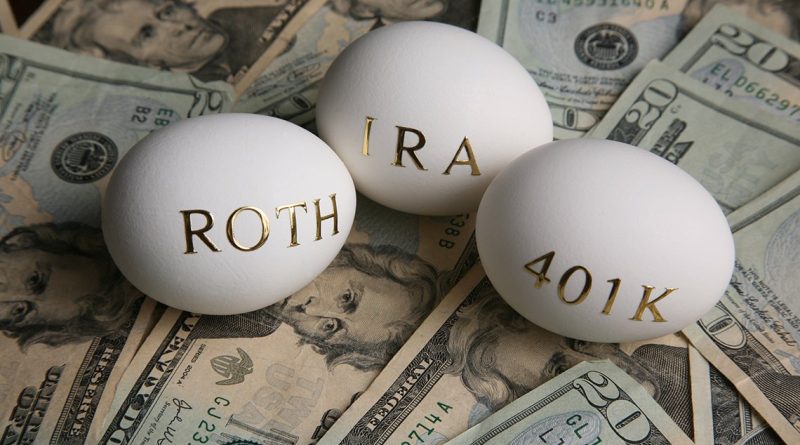Pairing a Roth IRA with your 401(k) Account
Working for 20, 30 or even 50 years is a long time. However, those years will fly by and before you know it, it will be time to retire. Many people fall short when the time comes and that is because they do not save enough or save the right way. A 401(k) account alone may not be enough to set you up for success. Pairing a Roth IRA with your 401(k) Account to your portfolio can drastically help you grow your money and give you another buffer for retirement.
What I am currently doing, and this is just me and I am not telling you to do the same, I am putting 15% into my 401(k) account from my job and every month I am putting $200 into my Roth IRA account and using that money to invest into stocks. In addition, I picked the investments my 401(k) chooses and found a couple good ones. Can check them out HERE.
Table of Contents
Roth IRA & Traditional 401(k) Comparison
| Roth IRA | Traditional 401(k) | |
| Management/control | You | Employer |
| Contributions | Post-tax | Typically pre-tax |
| 2023 contribution limits | $6,500 ($7,500 if over age 50) | $22,500 in 2023, $30,000 if over age 50 |
| Withdrawals | Qualified distributions are tax-free | Typically taxed |
| Required Minimum Distribution (RMD) | No RMDs | At age 73, you must take out the RMD each year to avoid tax penalties |
| Tax benefits | No tax benefit for the current year | Potentially lower current year taxable income |
Benefits of a Traditional 401(k)
With a 401(K) from your employer, it can provide an excellent source for your retirement. Even better if the company you work matches your contributions, this will lead to a hire retirement savings when it times. Most employers will match between 4% and 8%. My job matches 4% for every 8% I put in.
- Each paycheck, money is withdrawn automatically and placed in your 401(K) account. This helps you come tax time, as your taxable income is smaller because of this.
- Come retirement, your 401(K) account will send you a check each month based off what you selected. This way you do not have to worry about cashing anything out.
- 401(k) withdrawals in retirement are typically taxed, but your taxable income will be low so it will not be that much.
Benefits of a Roth IRA
Adding a Roth IRA account to compliment your retirement account can be a wise financial decision. By you adding extra funds towards your retirement in this account, you are giving yourself a better life later. I highly suggest maxing out your Roth IRA every year to maximize your retirement funds.
- Contributing to this account will use after-tax dollars. This means when you retire down the road, you will not be taxed on the money you get per month from this account.
- This account allows you to invest in stocks and grow your account that way. I am currently investing in dividends stocks and earning money from dividends as well as any gains the share price gets.
Differences between a 401(k) account and a Roth IRA.
By adding a Roth IRA account to your investment portfolio, you are maximizing your financial potential come retirement. There are other things to consider when pairing both of these accounts together.
- Investment options
- When picking investment options for your 401(K), you will be limited by what your employer allows. They will have a set list of options you can choose from, if you are lucky, you might have the ones listed HERE with your employer. Roth IRA will give you flexibility as you are not limited to a set list.
- You can choose between taxable and tax-free withdrawals
- You control how your taxes will be later on. If you want to minimize your taxes during a certain year, you can take more money out of your Roth IRA account instead of your 401(K).
- Your earnings and withdrawals from a Roth IRA will be tax-free and you will pay no fees for taking money out. If you take a distribution before age 59½, you would normally be subject to income taxes and a 10% early distribution penalty, although certain exceptions apply. The 10% penalty may not be imposed if the following conditions apply, see Exceptions to tax on early distributions for more information.
- Roth IRA funds are available for other uses
You can use Roth IRA contributions to fund other life milestones, such as:- Education expenses.
- Down payment on a home.
- Unexpected family emergency―even before you turn age 59½. Your contributions (not earnings) can be withdrawn from your Roth IRA at any time for any reason―federal tax and penalty free. You can withdraw what you put in for that year, penalty free.
I would highly suggest you add a Roth IRA account alongside your 401(K) account. Maxing out your Roth IRA every year with a 15% contribution for your 401(K) will set you up for an amazing retirement. The earlier you do this the better obviously, but it is never too late to start.
